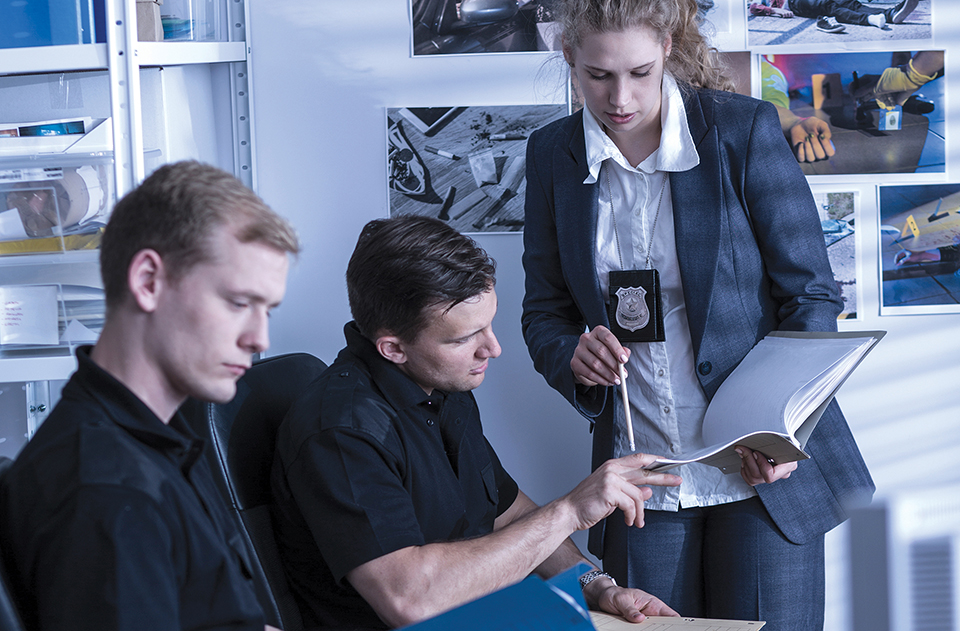
Features
Holding the Line
The power of collaboration
March 15, 2021 By Michelle Vincent
 Collaborative policing is key in effectively protecting
and serving the community.
Collaborative policing is key in effectively protecting
and serving the community. When emotional intelligence and teamwork are interwoven into the leadership framework, collaboration becomes both powerful and effective. In previous articles, I have mentioned that teamwork and collaboration are key in the effective delivery of operations in a policing organization. I once even approached my chief, as the unveiling of our new set of values took place, to discuss very important value had been left out. That value was collaboration.
Policing has its own culture that develops as a result of the kind of work we do. The long shifts we work together (we often spend more time with our colleagues than we do with our own families) and the traumas we experience connect and bond us. It is a sort of brotherhood—or should we say an exclusive club—to which we belong that ties us together, whether it’s healthy or not. This exclusivity comes at a great cost, on many levels. The relationship between the calls we attend, the untold expectation that we should be able to be strong and take our traumatic experiences as they come, the organic desire to serve our communities by helping others and the oath we took during our swearing in are tested on a regular basis.
Some of us mask our mental health challenges until we are in so deep we need a leave of absence to be able to work through them. Others display their mental health issues in undesirable actions at work, causing workplace liability. Growing mental health issues and the motivational competitiveness between us as police officers can result in muddied waters and cause us to stray from our original oath to protect and serve. Competition between
us (the “good guys”) and those we are arresting (the “bad guys”) can transpose into our everyday living and in our various ways.
“Competition separates while collaboration brings together.”
Advertisement
This competitiveness occurs on a physical and an intellectual level. Physically, we must work out, train through our defensive tactics/firearms and eat and sleep well. Intellectually, we must train in areas like forensics, investigative studies, physics and mathematics in order
to solve crimes accurately and efficiently. Competition is woven into our promotional processes, specialty unit opportunities and even throughout platoons to see who can acquire the greatest numbers of arrests and traffic tickets. Most of us were also raised in competitive environments within our families. Competitiveness is instinctual for survival of the fittest.
As our emotional intelligence grows and evolves, and we learn how we can be most efficacious in our worlds, we have to ask ourselves if our old ways and patterns truly serve us. Does competition create a healthy space in the workplace? Is it the best way to achieve our overall goals? This is where collaboration comes into the discussion.
The U.S. Department of Justice defines community policing as: “a philosophy that promotes organizational strategies that support the systemic use of partnerships and problem-solving techniques to proactively address the immediate conditions that give rise to public safety issues such as crime, social disorder and fear of crime”. This is what we should be striving to produce organizationally in policing from a leadership perspective.
Each day, we work together with our communities to ensure the safety of all. With this in mind, consider the synonyms of each word. Synonyms of competition are rivalry, competitiveness, conflict, contesting, opposition, contention, feuding, battling, fighting, strife,
struggling and war, while synonyms of collaboration are cooperation, alliance, partnership, participation, combination, association, teamwork. Which group of synonyms feels productive, solution-oriented and appears to be coming from an emotionally intelligent place? Which of these groups of words would likely be most effective from an emotionally intelligent and engaged workplace? Which would most likely achieve the goals of community policing? The answer is clear but most organizations still (understandably) run with the competitive theme instead.
Competition separates while collaboration brings together. I was taught that the most powerful and effective changes and organic growth come from within. Collaboration inspires us to be open, to work together, while competition motivates us outside of ourselves to be the best, maybe even losing sight of the ultimate goal. I challenge you to check out your organizational values and, if collaboration is not listed as a value, consider a discussion on adding it to the list. Its value is immeasurable.
Michelle Vincent is a retired York Regional Police officer and the founder of The Haven, Ontario’s first non-profit, inpatient treatment centre exclusive to first responders and uniform personnel.
Print this page